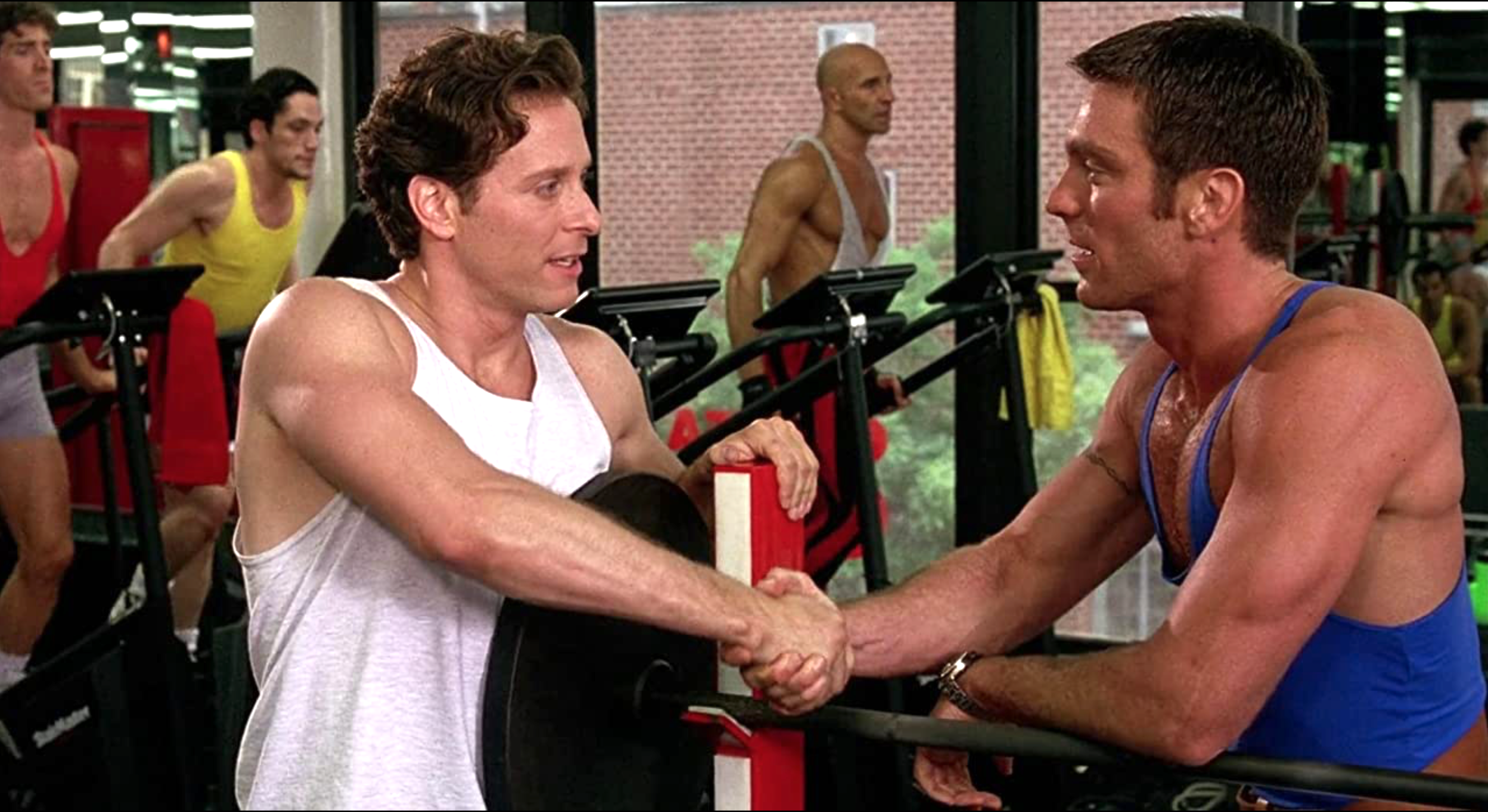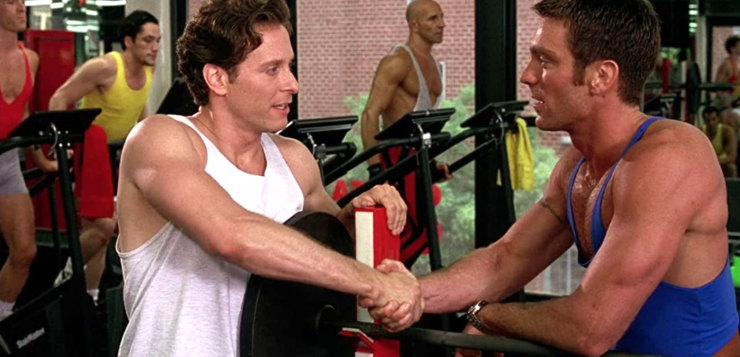PLAYING THE PALACEis Paul Rudnick’s new novel (reviewed in this issue), a romantic comedy in which sparks fly and eyebrows are raised when Carter Ogden, a lonely New York City events planner, meets Crown Prince Edgar of Great Britain. It’s the Prince who tracks down Carter to initiate a romance that turns into a zany romp through Britain’s most cherished institutions.
Rudnick is an Obie and Outer Critics Circle award winner whose plays have been produced on Broadway and Off,and around the world, among them: I Hate Hamlet (1991), Jeffrey (1993), The Most Fabulous Story Ever Told (1998), Valhalla (2004), and The New Century (2008). Among his writing credits for films are Jeffrey (1995), In & Out (1997), and The Stepford Wives (2004). His previous novels include Social Disease (1986), I’ll Take It: A Novel (1989), and Gorgeous (2013).
Rudnick is a regular contributor to The New Yorker, and his articles and essays have also appeared in The New York Times, Esquire, Vogue, and Vanity Fair. He is currently writing the book for the Broadway musical adaptation of The Devil Wears Prada. Last fall, HBO aired the film Coastal Elites, starring Bette Midler, for which Rudnick wrote the screenplay. In a review, Ben Brantley wrote: “Line by line, Mr. Rudnick may be the funniest writer for the stage in the United States today.”
This interview was conducted by telephone in late April.

Frank Pizzoli: Let’s get right to it: Why a joyous celebration of queer love in Playing The Palace? Too many previous bad dramatic endings in general for queers?
Paul Rudnick: Exactly. I wanted an all-stops-out story of queer romance. Nothing marginalized. No special pleading for their love, no careful explanations of gay love as normal or acceptable, no coddling. Readers can see Carter Ogden and Prince Edgar’s relationship begin, develop, and evolve as a full-on celebration. The fact that Carter’s a lonely New York event planner and Edgar’s a Crown Prince only adds to the stakes and the fun.
FP: Playing the Palace lands on top of the recent royal drama over race. What do you suppose might happen if queer replaced race in a similar turn of events?
PR: The U.K. has quite a large royal family, so queer representation is inevitable. There’s a queer princess or duke somewhere.
FP: Writing Playing the Palace the way that you did reminds me of what Edmund White has said in my interviews with him: that when the short-lived Violet Quill took shape in 1980–81, they created works that were of, by, and for gay men. No explanations of their characters’ daily reality as they lived it. Gay readers wouldn’t need that context or nuance explained.
PR: I wanted everything to be front and center. Prince Edgar is happily and openly gay in the novel. While Carter and Prince Edgar are open about their relationship, this does raise all the expected eyebrows. Progress can still take time.
FP: In 1993, you found it difficult finding a theater willing to produce your trail-blazing play Jeffrey, because it was described as a comedy about AIDS. Would you have that same problem today?
PR: Actually, there have been readings recently and some talk of bringing the play back. Political correctness has gone through several phases over the years. Look at the BBC’s terrific series It’s a Sin, which has been praised and criticized for its honesty and humor. Younger audiences are curious about queer history, and older people want their lives truthfully recalled.
FP: We cannot always evaluate a period piece with what we know today, only then?
PR: That’s right. There’s no one version of the gay experience. Each generation expands the story. And within each generation there may be themes but no single experience that could possibly cover everyone. No one play, novel, or film should ever be asked to represent all queer stories.
FP: Where does your wicked sense of humor come from, those rapid-fire oneliners?
PR: I come from a large, extended New York-New Jersey-based Jewish family, where humor always balanced despair. Comedy has always been essential for me. In periods of crisis, sometimes a wisecrack is the only defense available.
FP: Since 1998, you have frequently contributed humor pieces to The New Yorker. They’re so great—where do your ideas come from?
PR: Headlines, personal mishaps, and my editor’s suggestions.
FP: Something funny but self-contained for a one-page piece?
PR: Right, but not of novel length. I look for ideas that demand concision and just the right number of paragraphs. Comic writing, whether it’s a shorter piece or a full-length play, has a mathematical quality to it. You write, rewrite, and do your best to offer an ideal combination of action and dialogue.
FP: That has to be different from when you write lengthier pieces like plays or screenplays.
PR: I start out by vomiting my first draft onto the page. Then I get busy, through as many revisions as needed. Everything’s up for grabs.
FP: Tell us more about the creative energy of transforming a play or novel into a screenplay.
PR: Writing for the stage, the screen, or the page are wildly different creatures. A joke which might reliably soar in the theater can thud in a movie. The rhythms are very different. I’ve learned this through sometimes painful trial and error. I worked on Playing The Palace for years, until it finally took shape as a comic novel.
FP: After you’ve established characters, do they take over?
PR: Yes, which is something I love. Once I unleash fully rounded characters, they dictate the action, and can constantly surprise me.
FP: You certainly let your characters be who they are in The Most Fabulous Story Ever Told (1998). Protested by religious groups, the play did have a commercial run. The Daily News raved that the audience was “laughing uncontrollably.” No gag was left out—gay Santas and go-go boy elves. I wonder how a reprise would be greeted by evangelical Christianity’s obsession with all things gay, and their special animosity toward the transgender community.
PR: I intentionally wanted to place gay people at the beating heart of the Bible. Through Adam and Steve, along with the first lesbians, Jane and Mabel. I remember thinking that if I asked friends at a cocktail party to discuss their sex lives, they’d go on for days. But if I asked about faith and a belief in God, the situation would become much more fraught. For evangelicals, legislating against lgbtq people remains an obsession, and having Pence in the White House was especially disastrous.
FP: Are there any taboo topics left when it comes to comedy?
PR: Taboo material is often inherently comic because it makes people nervous, and human behavior is often hilarious. There was nothing funny about AIDS, but in Jeffrey I wanted to salute the queer community’s use of humor as a means of combating a plague and dealing with such unimaginable loss. Wit can become a valuable weapon. In Playing the Palace, Carter and Prince Edgar become the target of endless on-line chatter and prejudice, so their mutual sense of humor keeps them sane and in love.
FP: What about seeing humor within everyday experiences?
PR: Always! Here’s an example. Most of us are vigilant about wearing masks to prevent Covid infections. And one day recently I passed a stranger on the street who stared at me, panicked, and blurted out: “I’m sorry! I’m so sorry! I forgot my mask!” I knew just how he felt, because I’d once done the same thing and felt terribly guilty. He ran back to his apartment to grab his mask, after apologizing profusely to a total stranger.
It was understandable and endearing.
FP: Finally, Michael Urie has made an audio version of Playing the Palace. Any chance of it becoming a screenplay?
PR: Who knows. Anything can happen!
Frank Pizzoli has published interviews with many noted writers. He is the founding editor and publisher of Central Voice.





